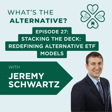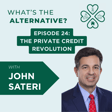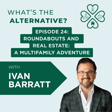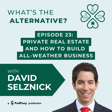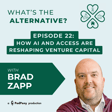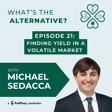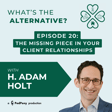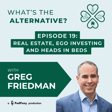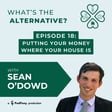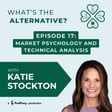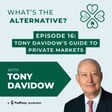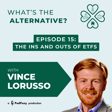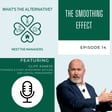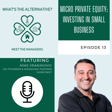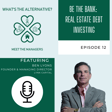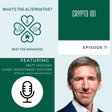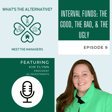
What's the Alternative? | Episode 7 | Achieving Alts for All By Leveraging Technology Featuring Steve Zuschin
Welcome to Banrion Capital Management’s What’s the Alternative Podcast! Join host Shana Orczyk Sissel, the “Queen of Alternatives” Founder & CEO of Banrion Capital Management, as she interviews leaders in the alternative investment space. Learn more about their firms, their passions and about the many different ways investors can use alternative investments to add value in their investment portfolios.
In this episode Shana sits down with Steve Zuschin, Chief Revenue Officer, at Mammoth Technology, to discuss how Banrion and Mammoth Technology have partnered together to develop a technology solution that is changing the way advisors allocate to alternative investments. With this new integrated platform, Banrion and Mammoth have reduced the operational friction that has historically been an obstacle for many advisors. A true game changer that offers "A Better Alternative" for advisors and clients alike.
Steve has a diverse work experience in the financial and technology sectors. Steve is currently serving as the Chief Revenue Officer (CRO) at Mammoth Technology, a technology and services company that focuses on revolutionizing the way funds are established and serviced. Prior to their current role, Steve held various executive positions at LifeYield, a transformative software company that helps financial firms, advisors, and investors optimize their assets. At LifeYield, they served as the Executive Vice President of Business Development, Executive Vice President of Advisor Success, and EVP of Sales. Before LifeYield, Steve worked as the Director of Business Development at HiddenLevers, a financial technology company. Steve also has experience as a Sales Person at Hentze-Dor and as a Financial Representative at Northwestern Mutual.
Steve Zuschin attended California State University, Chico from 2003 to 2006 and earned a Bachelor of Science degree in Financial Management.
Learn More About Mammoth Technology: Mammoth Technology
Connect with Mammoth Technology on 𝕏: @mammothfintech
Connect with Steve on LinkedIn: Steve Zuschin
Learn More About Banrion: Banrion Capital Management
Connect with Banrion on 𝕏: @Banrion_Capital
Connect with Shana on LinkedIn: Shana Orczyk Sissel
Connect with Shana on 𝕏: @shanas621
If you are an advisor wanting to check out our platform, we want to hear your feedback!
Important Disclosures:
The opinions expressed on the “What’s the Alternative Podcast” are for general informational purposes only and are not intended to provide specific advice or recommendations for any individual or on any specific security.
It is only intended to provide education about the financial industry. To determine which investments may be appropriate for you, consult your financial advisor prior to investing. Any past performance discussed during this program is no guarantee of future results.
The guests featured on this program are participants on Banrion Capital Management’s platform. As such Banrion may receive payment for their participation as a platform partner.
Any indices referenced for comparison are unmanaged and cannot be invested into directly. As always please remember investing involves risk and

